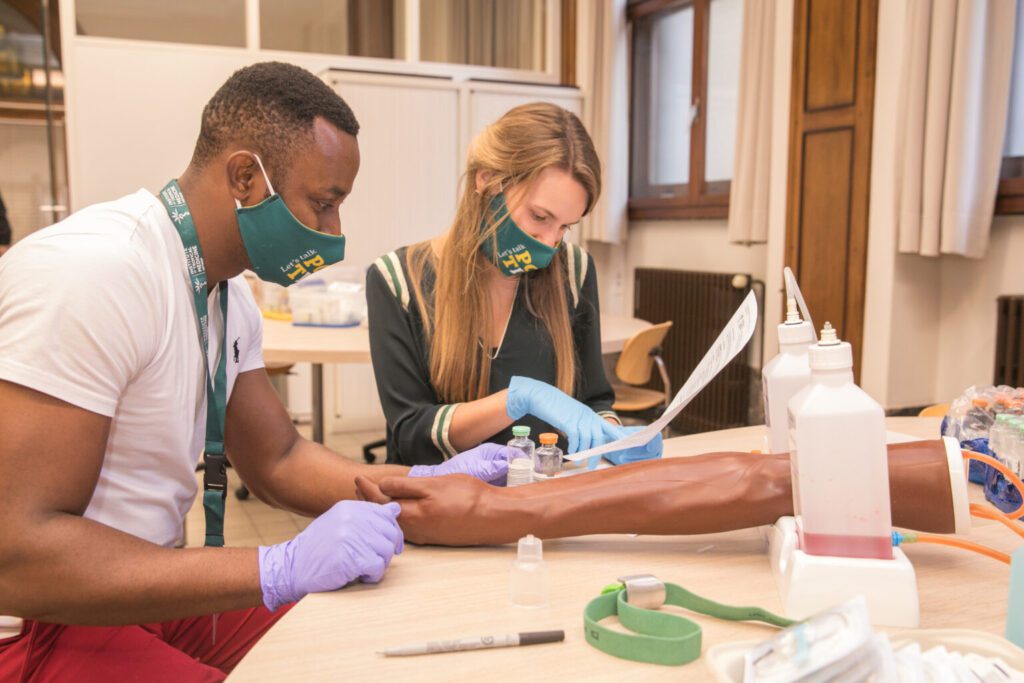
The COVID-19 pandemic was the first crisis in decades to affect the entire world, leaving no country untouched. Even today, recovery remains incomplete: as of May 11, 2025, test positivity rates reached 11% in 73 reporting countries. This mirrors the peak of July 2024, when positivity reached 12% in 99 countries. That’s close to the July 2024 peak of 12% in 99 countries and far above the 2% reported in February 2025.
These numbers show just how unprepared we still are for global health problems. Without stronger policies, resilient systems, and coordinated responses, history risks repeating itself when the next crisis arrives. Preparing a skilled workforce is one of the most important steps toward building that resilience. If you’re interested in shaping public health, here are three universities producing job-ready public health professionals.

The College of Medicine is home to more than 740 medical students, 950 trainees in residency and fellowship programs, and 1,500 faculty members. Source: Medical University of South Carolina
Medical University of South Carolina
In the heart of Charleston, South Carolina, a legacy of care began in 1824 with the founding of the Medical University of South Carolina (MUSC). What started two centuries ago has grown into the state’s only comprehensive academic health sciences system — one with a goal to improve disease prevention, patient and community wellness, and population health through education and research.
Carrying that mission forward is the Department of Public Health Sciences (DPHS) in MUSC’s College of Medicine. Among its many offerings is the Master of Public Health (MPH). Whether you’re drawn to Biostatistics, Epidemiology, or Health Behavior and Health Promotion, the MPH equips you with the skills to lead in public health. If you’re looking for something flexible, there is the MPH’s Generalist program.
If you seek to help communities recover from a health crisis or to help shape policies that keep families healthier for generations, the Generalist program makes that vision possible. You will learn to evaluate health across populations and design strategies to implement them. With this foundation, you’ll be ready to shape healthier futures in public health agencies, health departments, hospitals, other health care organisations, government regulatory agencies, not-for-profit agencies, academic institutions, and industry in South Carolina and beyond. “The online program has been both enjoyable and intellectually engaging. The schedule and professors are incredibly accommodating, making it easy for individuals like me who are working full-time to manage the workload and be flexible,” says Nicole Sullivan, Class of 2025.
And because public health challenges don’t stop at borders, neither does MUSC. The MUSC Center for Global Health is a hub that connects students, scholars, and faculty with opportunities that stretch far beyond Charleston. From global travel and education and training to research and funding, the center opens doors worldwide. The MUSC campus feels like home for international arrivals, with International Student & Scholar Services and events like luncheons, cultural outings, English classes, workshops, new student orientations, and the annual International Bazaar. Ultimately, the center’s mission is to enhance MUSC’s global health impact while cultivating an inclusive and collaborative community.

ITM’s biomedical and clinical sciences courses have been redesigned with digital and blended learning to meet the evolving needs of learners. Source: Institute of Tropical Medicine
Institute of Tropical Medicine
The Institute of Tropical Medicine (ITM) in Antwerp is one of the world’s leading institutes for training and research in tropical medicine. It offers a wide range of programs in tropical medicine, international public health, and global One Health for professionals worldwide. They are led by professors whose fieldwork and passion bring real-world challenges into the classroom, inspiring students to act and create impact that lasts.
The MSc in Public Health is one such program. It welcomes professionals and researchers with degrees in health or related fields, including pharmacy, nursing, medical anthropology, and health economics. Even if your degree isn’t health-related, admission is possible if you have relevant experience and research skills. The program is designed to prepare you to tackle the biggest health challenges of our time. Examples include changes in health and population caused by global warming, rapid urban growth, and fragile living conditions, ongoing health inequalities, and growing sexual and reproductive health needs.
There’s no single solution to tackle today’s global health challenges. That’s why the MSc in Public Health takes a systems-based approach that helps you see the connections between people, systems, and solutions. You will develop research and management skills and learn to apply multidisciplinary, evidence-informed insights in various real-world contexts. Just as importantly, you will be challenged to live by values like equity, fairness, and justice, which is how so many students leave as leaders of change. Many take up senior leadership and policy roles after graduating.

London School of Hygiene & Tropical Medicine is a leader in pandemic preparedness, developing students to be the same. Source: London School of Hygiene & Tropical Medicine
London School of Hygiene & Tropical Medicine
London School of Hygiene & Tropical Medicine (LSHTM) is a world-leading center for research and postgraduate education in public and global health. Its stimulating specialized programs train students to become highly sought-after global leaders.
Choose the MSc Epidemiology to explore epidemiological methods underpinning clinical medical research, public health practice and health care evaluation. Students gain the skills to make valuable contributions to both epidemiological research and public health, to investigate the causes of disease, and to evaluate interventions to prevent or control both communicable and non-communicable diseases.
For a program that bridges the fields of epidemiology, laboratory sciences and public health, the MSc Control of Infectious Diseases is your best option. Learn how to investigate the transmission of endemic and epidemic infections and how to design, implement and evaluate coordinated control methods. You can undertake a research project overseas.
Their flagship MSc Public Health equips students with the knowledge and skills to address real global health challenges that encompass low-, middle- and high-income countries. Learn how to critically assess key public health functions and how to formulate, implement and evaluate policy responses to public health problems. You can choose a specialized stream of study to suit your interests: Environment & Health, Health Economics, Health Promotion, Health Services Management, Health Services Research, or Public Health (General stream).
*Some of the institutions featured in this article are commercial partners of Study International









